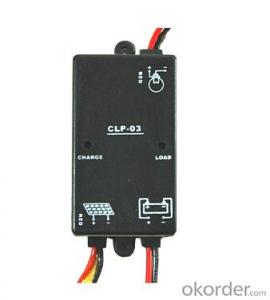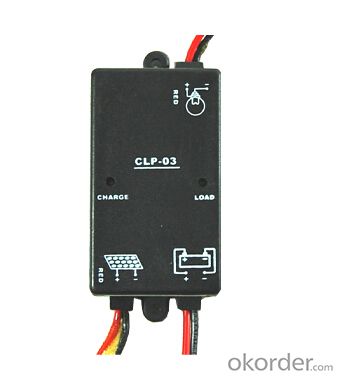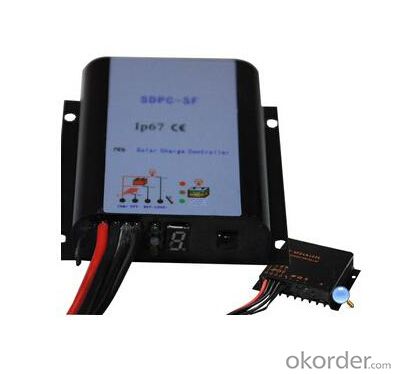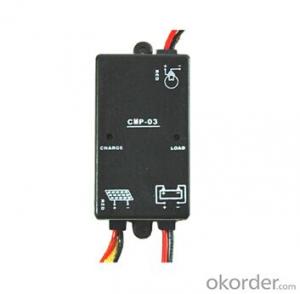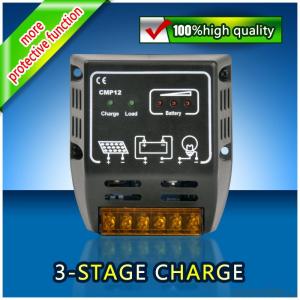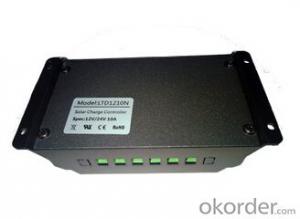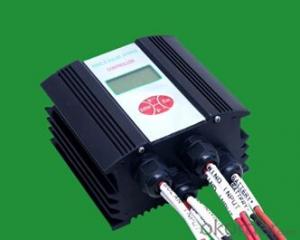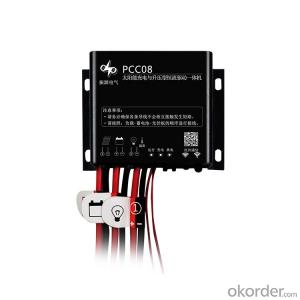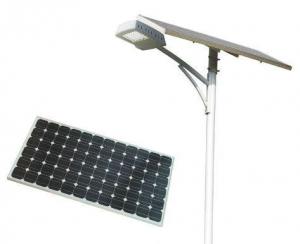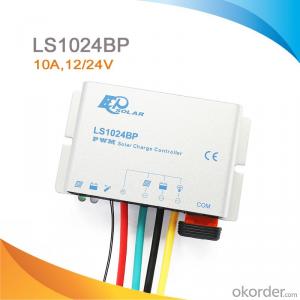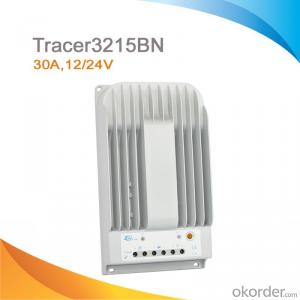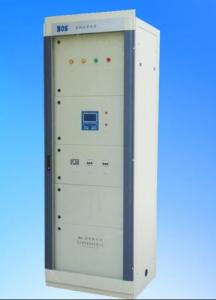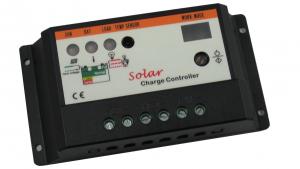Solar Streetlight Controller Model CLP03
- Loading Port:
- Shanghai
- Payment Terms:
- TT OR LC
- Min Order Qty:
- 10 unit
- Supply Capability:
- 200 unit/month
OKorder Service Pledge
OKorder Financial Service
You Might Also Like
1. Structure of Solar Streetlight Controller Model CLP03
This solar controller is designed for solar lawn lights, solar garden lights, mini solar street light, mini solar advertising light box and so on. The box of the controller is compact sealed with silicon. It is fit for 24W/12V or 36W/12V solar panels.
2. Main Features of Solar Charge Controller Model CLP03
· Smart size
· Light control function
· Temperature compensation during charging and discharging
3. Solar Charge Controller Model CLP03 Specification
Function:
1.Charge controlling: when the voltage of battery≧14.4V(with temperature compensation),controller will be shifted to floating-charge controlling, to prevent over-charging;
2.Discharge controlling: when the voltage of battery≦10.5V(with temperature compensation),controller will shut down the load,to prevent over-discharging;
3.Lighting controlling:when the voltage of solar panel≦5V(night is come on),after 30S,the load will be turned on ; when the voltage of solar panel≧5V(it is the dawn),the load will be shut down.
Rated Voltage | 12V |
Rated Charge Current | 1A or 3A |
Rated Discharge Current | 1A or 3A |
HVD (High Voltage Disconnection) | 14.4V |
Temperature Compensation | -3mV/℃/cell |
Size | 55×36×20mm |
LVD (Low Voltage Disconnection) | 10.5V |
LVR (Low Voltage Reconnection) | 12.0V |
Light Controller Mode | visibility 20m |
Temperature | -10- +40℃ |
Relative Humidity | ≦90% |
Net weight | 33g |
4. Solar Charge Controller Model CLP03 Images
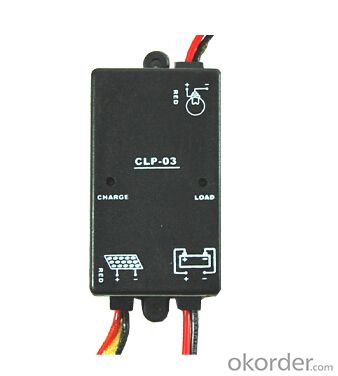
5. FAQ
a) How about your company?
We are able to supply 300,000 inverters and 60,000 solar energy charge controllers per year, the products are sold toward domestic and Europe, Australia Africa and other regions in great quantities.
b) How to guarantee the quality of the products?
The company is approved by the ISO9000 quality management system with its strict product quality control. The products for exportation pass the inspection of relevant foreign nations (CE, ROHS), and get high evaluation of the customers.
c) How long can we receive the product after signing Sales Confirmation?
Generally speaking, if there is enough quantity of finished products which can meet the clients’ requirement, we can manage the delivery within three to five working days according to the instruction of the payment terms in the Sales Confirmation; if the products need some time to get ready, we will arrange thedelivery as soon as possible after the manufacture.
- Q: How does a solar controller prevent damage to the solar panels during high voltage conditions?
- Playing a crucial role in safeguarding solar panels from high voltage conditions, a solar controller, also known as a charge controller, acts as a regulator between the panels and the battery or power grid. Its primary function is to carefully control and maintain the voltage and current levels within safe limits. When faced with excessive sunlight or a fully charged battery, the solar controller swiftly detects the rise in voltage and implements necessary measures to prevent any potential damage. It utilizes various techniques to regulate the solar panels' output and shield them from harm. To begin with, the solar controller prevents battery overcharging, a function of utmost importance. Once the battery reaches its full charge, the solar controller automatically disconnects the panels, effectively halting the charging process. This preventive measure safeguards the battery from degradation and extends its lifespan. By disconnecting the panels during high voltage conditions, the solar controller ensures optimal operation without subjecting them to excessive strain. Furthermore, the solar controller incorporates pulse width modulation (PWM) or maximum power point tracking (MPPT) techniques to regulate the voltage and current output of the panels. PWM controllers intermittently interrupt the charging current to maintain a stable voltage level, eliminating voltage spikes that could potentially harm the panels. On the other hand, MPPT controllers continuously monitor the panels' output and adjust the voltage and current to maximize energy harvesting efficiency. This not only optimizes the panels' performance but also prevents any potential damage that may occur during high voltage conditions. In conclusion, a solar controller safeguards solar panels from damage during high voltage conditions by disconnecting them from the battery to prevent overcharging and utilizing techniques like PWM or MPPT to regulate the voltage and current levels. These measures guarantee the panels' safe operation, ensuring maximum performance and an extended lifespan.
- Q: Can a solar controller be used with solar-powered well pumps?
- Yes, a solar controller can be used with solar-powered well pumps. A solar controller is an essential component of a solar power system as it regulates the charging and discharging of batteries, ensuring efficient and safe operation. In the case of solar-powered well pumps, a solar controller is responsible for controlling the flow of power from the solar panels to the pump, preventing overcharging or draining of the batteries. It also helps to optimize the performance of the pump by ensuring that the power generated by the solar panels is utilized effectively. Therefore, using a solar controller with solar-powered well pumps is highly recommended to enhance the overall efficiency and longevity of the system.
- Q: What is the role of a solar controller in maximizing solar panel efficiency?
- The role of a solar controller in maximizing solar panel efficiency is crucial in ensuring optimal performance and protection of the solar panel system. Solar controllers, also known as charge controllers or solar regulators, are responsible for regulating the flow of energy between the solar panels and the batteries or electrical loads. One of the main functions of a solar controller is to prevent overcharging of the batteries. As solar panels generate electricity, they continuously charge the batteries. However, if the batteries are overcharged, it can lead to damage and reduced lifespan. The solar controller monitors the battery voltage and ensures that the charging process is controlled and optimized, preventing overcharging and extending the battery life. Moreover, solar controllers also protect the batteries from deep discharge. When the batteries are not being charged, they can discharge power back into the solar panels, causing damage and reducing overall efficiency. The solar controller prevents this by disconnecting the solar panels from the batteries when the voltage drops below a certain threshold, preserving battery capacity and preventing damage. Additionally, solar controllers play a role in maximizing the efficiency of the solar panels by maximizing the power output. They employ Maximum Power Point Tracking (MPPT) technology, which allows the solar panels to operate at their maximum power output regardless of changes in temperature or shading. MPPT technology continuously adjusts the voltage and current to find the optimal operating point for the solar panels, ensuring that they are always producing the maximum amount of power possible. In summary, the role of a solar controller in maximizing solar panel efficiency is to regulate the flow of energy, prevent overcharging and deep discharge of batteries, and employ MPPT technology to optimize the power output of the solar panels. By performing these functions, solar controllers ensure that the solar panel system operates at its highest efficiency, maximizing the generation of clean, renewable energy.
- Q: How do I protect a solar controller from electromagnetic interference?
- To protect a solar controller from electromagnetic interference, you can take a few measures. Firstly, make sure the controller is installed in a location away from other electronic devices that emit electromagnetic radiation. This will minimize the chances of interference. Additionally, using shielded cables and grounding the system properly can help reduce electromagnetic interference. Lastly, you may consider using ferrite beads or filters to suppress any potential interference.
- Q: What is the role of a solar controller in preventing damage to the solar panels from birds or animals?
- The role of a solar controller in preventing damage to solar panels from birds or animals is primarily to deter them from landing or nesting on the panels. Solar controllers typically use various deterrent mechanisms to achieve this. One common method is the use of ultrasonic sound waves that are inaudible to humans but are unpleasant to birds and animals. These sound waves create a hostile environment around the solar panels, making them less attractive to birds or animals seeking a perch or nesting spot. The solar controller emits these sound waves periodically, effectively keeping the area around the panels clear. Another approach used by solar controllers is the implementation of visual deterrents, such as reflective surfaces or moving objects. Birds and animals are often scared away by shiny or reflective surfaces, as they perceive them as potential predators or threats. Incorporating these visual deterrents into the solar controller's design helps to discourage birds and animals from approaching the panels. Furthermore, solar controllers may also utilize physical barriers or netting to block access to the panels. This prevents birds or animals from landing directly on the panels or damaging them with their claws or beaks. These physical barriers are designed to be lightweight and durable, ensuring they do not interfere with the solar panels' performance while effectively protecting them from potential damage. In summary, the role of a solar controller in preventing damage to solar panels from birds or animals is to create an environment that is unattractive and inhospitable to these creatures. By employing deterrent mechanisms such as ultrasonic sound waves, visual deterrents, and physical barriers, solar controllers help maintain the integrity and functionality of the solar panels by keeping birds and animals at bay.
- Q: Solar controller use
- The controller as a core component of solar energy must be a reliable product, otherwise no matter how good the solar system can not play its due role.
- Q: How do you determine the appropriate size of a solar controller for your system?
- To determine the appropriate size of a solar controller for your system, you need to consider the maximum current and voltage rating of your solar panels. The solar controller should have a current and voltage rating that can handle the maximum capacity of your panels without causing any damage. It is also important to consider the load or appliances connected to the solar system and ensure that the controller can handle the power requirements of those devices. Additionally, factors like the system's temperature range, efficiency, and any future expansion plans should be taken into account when selecting the appropriate size of a solar controller.
- Q: What are the common failure modes of a solar controller?
- The common failure modes of a solar controller include overcharging or undercharging of batteries, voltage spikes or fluctuations, failure to regulate the charge or discharge process, and damaged or malfunctioning components such as diodes, capacitors, or circuit boards.
- Q: How does a solar controller prevent short circuits?
- A solar controller prevents short circuits by constantly monitoring and regulating the flow of electrical current from the solar panels to the battery or load. It incorporates various protective mechanisms, such as fuses, breakers, and diodes, to ensure that any unexpected surge in current or abnormal voltage does not lead to a short circuit. Additionally, it uses sophisticated circuitry to detect and isolate any faulty or damaged components, thus preventing the occurrence of short circuits.
- Q: Can a solar controller be used with solar-powered air conditioning systems?
- Yes, a solar controller can be used with solar-powered air conditioning systems. A solar controller is designed to regulate and optimize the charge of solar panels and batteries, ensuring efficient energy utilization. When integrated with a solar-powered air conditioning system, the controller can manage the flow of electricity, maintain battery health, and effectively power the cooling unit using solar energy.
Send your message to us
Solar Streetlight Controller Model CLP03
- Loading Port:
- Shanghai
- Payment Terms:
- TT OR LC
- Min Order Qty:
- 10 unit
- Supply Capability:
- 200 unit/month
OKorder Service Pledge
OKorder Financial Service
Similar products
Hot products
Hot Searches
Related keywords
